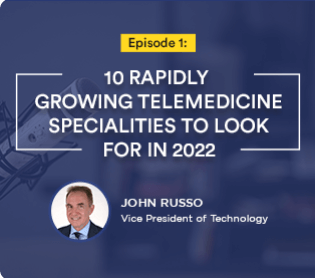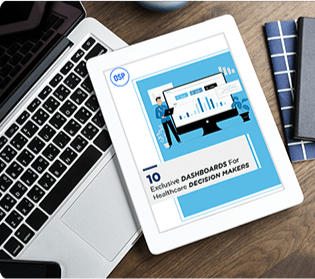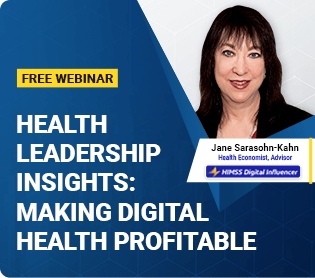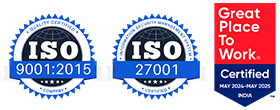Introduction:
Every year the US FDA gets nearly 100,000 cases of medication errors. The paper-based prescription system is a potential reason, but there are other issues too. Nevertheless, the solution is e-prescription software. Adopting this e-prescription software can resolve problems related to medication and offer additional benefits. Most healthcare management today prefers an e-prescribing system to enhance the medication system. Moreover, healthcare providers using cloud computing can quickly adopt this cloud-based solution for paperless prescribing services.
E-prescription software offers accuracy to doctors, pharmacists, and patients too. It’s a standalone app that integrates with electronic health records or EMR. So, doctors and pharmacists need not worry about failing refills and medication adherence, as the e-prescribing system helps maintain patients’ health. Besides, the current global market of e-prescription software is worth $1.2 billion, and market experts estimate that it will be worth almost $3.3 billion by 2025. Moreover, COVID-19 has also boosted digital tools and software to streamline care and administrative tasks. All tech solutions like medical informatics, healthcare analytics solutions, and more facilitate enhanced care outcomes. And e-prescribing applications are also improving the same. Keep reading to know more about this cloud-based solution e-prescription software.
Key Factors Affecting the E-Prescribing Software
Implementing electronic prescription software requires adequate tech support and established goals. For any practice management, ensuring error-less care outcomes is critically important. And a solution like electronic prescription is capable of resolving medication errors. However, providers need to include some of the critical factors that affect the e-prescription software. So, the e-prescribing software development team must incorporate these aspects for better performance and outcomes.
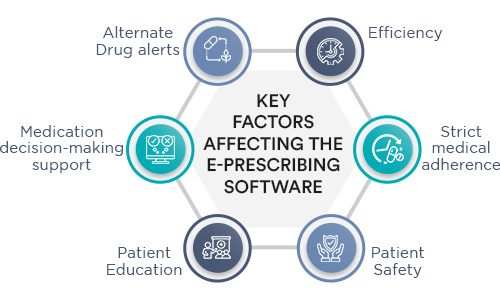
1. Efficiency
Unlike handwritten prescriptions, e-prescription software solutions usually take a few seconds to write out the prescription. Even though a few seconds is fine but at the time, it takes longer. And not attending to this issue is a mistake pharmacists or providers make. They are analyzing and resolving issues timely increases the efficiency of the e-prescribing software. So, when implementing or integrating e-prescription software, the provider must check with issues regularly to boost efficiency. Moreover, providers must oversee the e-prescription system’s integration with EHR/ EMR to ensure better medication outcomes and medical records management.
2. Strict medical adherence
Another aspect that impacts e-prescription software is medication adherence. Chronic patients or geriatric patients often forget to take their medicines. And failure to take medication timely results in hospital readmissions, sudden ER visits, and decline in health. So, providers need to ensure that the e-prescription software includes strict medication adherence aspects. Besides, healthcare providers with integrated pharmacy management software can also improve their population health management services and boost their practice.
3. Patient Safety
Patient safety is one of the most critical factors impacting electronic prescriptions for providers. Medication errors have often resulted in severe health consequences. And for providers or pharmacists, e-prescribing applications are a sigh of relief about patients’ health safety. Moreover, better patient safety means better patient experience and care outcomes. So, the e-prescribing system can also boost the providers’ patient engagement systems.
4. Patient Education
Not all patients know about their medication well. So, providers need to educate patients about it. E-prescribing applications help providers to educate patients. So, the e-prescribing software must include features about patient education to inform and help them make medical decisions.
5.Medication decision-making support
Alongside patient education, e-prescription software also helps patients with medication decision support. Choosing the proper medication depends on both providers/pharmacists and patients. Price, allergies, and other factors impact patients’ medication decisions. But the e-prescription software aids in this decision-making process so that patients get the right medicines.
6. Alternate Drug alerts
Drug allergies or controlled substances are potential reasons for opting for alternate drugs. E-prescription software alerts patients with the best alternate drug options to help them choose the right medicine.
How E-Prescribing Software Works
Pharmacy management software implemented by providers has some basic features that boost the e-prescribing process. Here are some of the most common features of e-prescribing software.
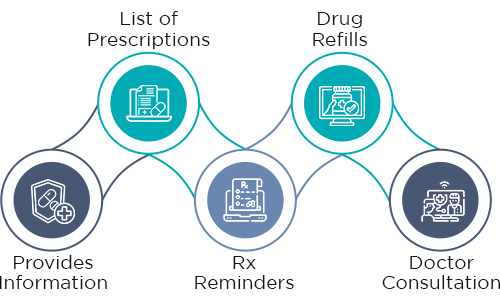
1. Provides Information
Providers/doctors find the e-prescription software system a great help in accessing patients’ insurance coverage details. And this even allows doctors to prescribe patients drugs covered under their insurance. However, e-prescription applications extract information from PBM files to get the list of drugs. With this list, the doctor e-prescribes suitable medications to its patients. Providers can use healthcare automation solutions to speed up the collection process from PBM files.
2. List of Prescriptions
E-prescription software includes multiple functionalities. It provides insurance information and even shows prescription history. When the doctor knows the previous prescription details, prescribe new ones. This also reduces medication errors. So, the e-prescription software development team must pay attention to these features.
3. Rx reminders
Patients often require reminders to take their medicines or drug refills. An e-prescribing system takes care of this too. It offers Rx reminders to help patients take their medications on time and recover faster.
4. Drug Refills
Like Rx reminders, e-prescription software offers easy drug refill options. Even before the patient’s medicines are finished, the e-prescription system generates a request for drug refill to the doctor. This way, the e-prescribing software reduces medication misses and drug delivery errors.
5. Doctor Consultation
The last feature of an electronic prescription is doctor consultation. This option allows patients to consult a doctor whenever their medication refill is required. So, e-prescription software even manages doctor visits along with medication adherence. However, in doctor consultation, providers need to manage electronic data exchange to reduce errors. So, integrating the software with EHR/EMR is a smart move. Overall, this also improves the health outcomes of patients.
Benefits of E-Prescribing Software
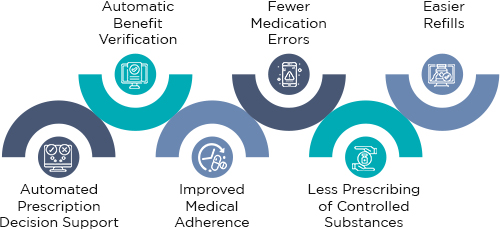
With the features listed above, e-prescribing software can effectively manage the medication and Rx tasks. Besides, this software offers many benefits to providers/pharmacists that enhance patients’ health. So, here are some of the primary benefits of implementing e-prescribing software.
1. Automated Prescription Decision Support
No clinician can remember the prescribed drug-related information. Moreover, drugs come in different forms and strengths. So, doctors can resort to e-prescription software to support making clinical decisions support system. This prescription management software helps clinicians study patient medical records and pharmacy history before prescribing drugs to them—these benefits providers and patient in different ways.
2. Automatic Benefit Verification
Another major advantage of using e-prescribing software is benefit verification of patients. Patients with insurance and other Medicaid benefits are eligible for specific drugs. So, with e-prescribing applications, clinicians need to verify hours, as this software takes care of it quite well.
3. Improved medical adherence
E-prescribing system even helps patients adhere to their medications. Often patients forget to take medications or fail to get them refilled. Whatever be the issue, this electronic prescribing system ensures that patients never miss their medicines and even sends alerts to remind them.
4. Fewer Medication errors
Automating the pharmacy system ensures fewer medication errors. Unlike the paper-based prescription system that incurred different errors, the electronic pharmacy system automates every step to eliminate errors in assigning medicines and other related issues.
5. Less prescribing of controlled substances
Electronic prescriptions for providers integrated with the PDMP interface helps providers and pharmacists review patients’ use of controlled substances. This ensures that patients consume safe drugs that don’t adversely impact their health.
6. Easier refills
The last and most useful benefit of e-prescription software solutions is easier refills. Patients and doctors no longer need to worry about timely Rx refills. The prescription management software ensures that patients’ medications are refilled on time to impact their health.
Conclusion
E-prescription software implementation is beneficial for all entities of the care episode. However, developers and providers must oversee the potential risks that can affect the operability of the software. Besides, providers must also ensure that the software is a HIPAA-compliant solution that protects patients’ privacy. Moreover, e-prescription software requires attention and tech support to boost its performance. So, if you wish to implement e-prescription software, you need the proper vendor support to develop the software as per your needs. Above all, e-prescription software is the solution that enhances overall patient care and assures clinicians of better health outcomes.
OSP is a trusted software development company that delivers bespoke solutions as per your business needs. Connect with us to hire the best talents in the industry to build enterprise-grade software.
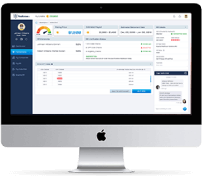
How can we help?
Fill out the short form below or call us at (888) 846-5382
Looking for software solutions to build your product?
Let's discuss your software solutions for your product in our free development acceleration call!
Get In Touch arrow_forwardDiscuss Your Project Handover with a team of expert Book a free consultation arrow_forward
About Author

Written by Riken Shah linkedin
Riken's work motto is to help healthcare providers use technological advancements to make healthcare easily accessible to all stakeholders, from providers to patients. Under his leadership and guidance, OSP Labs has successfully developed over 600 customized software solutions for 200+ healthcare clients across continents.












